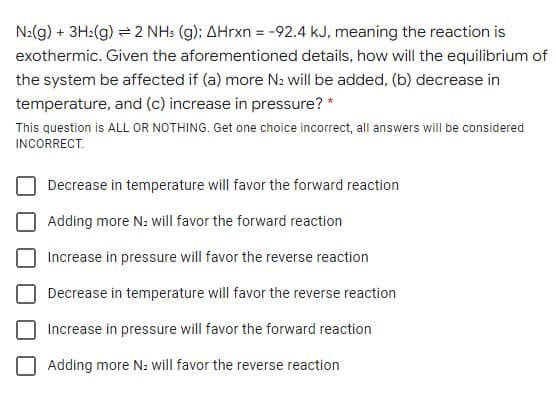N:(g) + 3H:(g) = 2 NH: (g); AHrxn = -92.4 kJ, meaning the reaction is exothermic. Given the aforementioned details, how will the equilibrium of the system be affected if (a) more N2 will be added, (b) decrease in temperature, and (c) increase in pressure? * This question is ALL OR NOTHING. Get one choice incorrect, all answers will be considered INCORRECT. Decrease in temperature will favor the forward reaction Adding more N: will favor the forward reaction Increase in pressure will favor the reverse reaction Decrease in temperature will favor the reverse reaction Increase in pressure will favor the forward reaction Adding more N: will favor the reverse reaction
N:(g) + 3H:(g) = 2 NH: (g); AHrxn = -92.4 kJ, meaning the reaction is exothermic. Given the aforementioned details, how will the equilibrium of the system be affected if (a) more N2 will be added, (b) decrease in temperature, and (c) increase in pressure? * This question is ALL OR NOTHING. Get one choice incorrect, all answers will be considered INCORRECT. Decrease in temperature will favor the forward reaction Adding more N: will favor the forward reaction Increase in pressure will favor the reverse reaction Decrease in temperature will favor the reverse reaction Increase in pressure will favor the forward reaction Adding more N: will favor the reverse reaction
Chemistry: An Atoms First Approach
2nd Edition
ISBN:9781305079243
Author:Steven S. Zumdahl, Susan A. Zumdahl
Publisher:Steven S. Zumdahl, Susan A. Zumdahl
Chapter12: Chemical Equilibrium
Section: Chapter Questions
Problem 3RQ
Related questions
Question
Please answer all (8)

Transcribed Image Text:N:(g) + 3H2(g) = 2 NH: (g); AHrxn = -92.4 kJ, meaning the reaction is
exothermic. Given the aforementioned details, how will the equilibrium of
the system be affected if (a) more N2 will be added, (b) decrease in
temperature, and (c) increase in pressure? *
This question is ALL OR NOTHING. Get one choice incorrect, all answers will be considered
INCORRECT.
Decrease in temperature will favor the forward reaction
Adding more N: will favor the forward reaction
Increase in pressure will favor the reverse reaction
Decrease in temperature will favor the reverse reaction
Increase in pressure will favor the forward reaction
Adding more N: will favor the reverse reaction
Expert Solution
This question has been solved!
Explore an expertly crafted, step-by-step solution for a thorough understanding of key concepts.
Step by step
Solved in 2 steps

Knowledge Booster
Learn more about
Need a deep-dive on the concept behind this application? Look no further. Learn more about this topic, chemistry and related others by exploring similar questions and additional content below.Recommended textbooks for you

Chemistry: An Atoms First Approach
Chemistry
ISBN:
9781305079243
Author:
Steven S. Zumdahl, Susan A. Zumdahl
Publisher:
Cengage Learning


Chemistry
Chemistry
ISBN:
9781305957404
Author:
Steven S. Zumdahl, Susan A. Zumdahl, Donald J. DeCoste
Publisher:
Cengage Learning

Chemistry: An Atoms First Approach
Chemistry
ISBN:
9781305079243
Author:
Steven S. Zumdahl, Susan A. Zumdahl
Publisher:
Cengage Learning


Chemistry
Chemistry
ISBN:
9781305957404
Author:
Steven S. Zumdahl, Susan A. Zumdahl, Donald J. DeCoste
Publisher:
Cengage Learning

Chemistry by OpenStax (2015-05-04)
Chemistry
ISBN:
9781938168390
Author:
Klaus Theopold, Richard H Langley, Paul Flowers, William R. Robinson, Mark Blaser
Publisher:
OpenStax

Chemistry for Engineering Students
Chemistry
ISBN:
9781337398909
Author:
Lawrence S. Brown, Tom Holme
Publisher:
Cengage Learning

Introductory Chemistry: A Foundation
Chemistry
ISBN:
9781285199030
Author:
Steven S. Zumdahl, Donald J. DeCoste
Publisher:
Cengage Learning